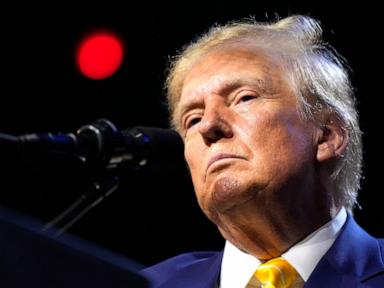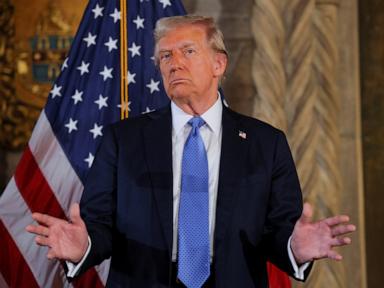Here's why Trump’s hush money judge rebuffed the immunity claim

President-elect Trump suffered a major loss in his bid to toss his New York criminal conviction when a judge ruled Monday that the guilty verdict withstands the Supreme Court’s presidential immunity ruling.
While Trump’s effort to dismiss the case now that he’s president-elect is still pending, Judge Juan Merchan’s latest ruling shot down the former president’s arguments that the Manhattan district attorney’s office showed jurors five categories of evidence that ran afoul of the justices’ new test.
The Supreme Court ruled that former presidents enjoy absolute immunity for actions within their core constitutional authority and at least presumptive immunity for all other official acts. Unofficial acts are unprotected.
Here’s how the judge analyzed each piece of challenged evidence:
Hope Hicks testimony
Trump challenged testimony from Hope Hicks, his 2016 campaign press secretary who later became White House communications director.
Hicks detailed her efforts shaping media narratives during the campaign, including how aides handled the infamous “Access Hollywood” tape in which Trump is heard bragging about grabbing women’s genitals.
But Hicks went on to testify about four communications she had with Trump while in the White House concerning the hush money deals at the center of the case.
Merchan ruled the communications were unofficial since they related to alleged intimate interactions between Trump and two women before he took office.
“The testimony was most certainly palpably beyond any actual authority Defendant possessed in his capacity as President,” Merchan wrote.
Trump’s attorneys argued that any communication between Trump and Hicks in the White House must receive immunity to preserve the president’s ability to speak freely to their aides.
“Defendant's attempts to sweep these communications under the protections afforded by the Take Care and Vesting Clauses is unpersuasive and Defendant has not referenced any Constitutional authority upon which he was acting for any of the four communications with Ms. Hicks,” Merchan wrote, rejecting the argument.
Madeleine Westerhout testimony
Trump similarly challenged the testimony of Madeleine Westerhout, the only other White House aide that testified.
Westerhout served as Trump’s White House secretary and confirmed to the jury details about how Trump signed the checks that partially make up his charges.
Merchan ruled that Trump failed to preserve his ability to challenge Westerhout’s testimony by not raising an immunity objection in pre-trial court filings or at trial.
“Because Defendant failed to timely object to Ms. Westerhout's testimony about Defendant's ‘work habits,’ ‘preferences,’ ‘relationships and contacts,’ and ‘social media’ practices at the White House, the motion to set aside the verdict on those grounds is denied as unpreserved,” Merchan wrote.
The judge went on to indicate that her testimony wasn’t protected, anyways, saying it “did not reference any official conduct.”
“Ms. Westerhout's testimony about her observations that Defendant preferred to work in a dining area rather than at the Resolute Desk, or that he preferred to use a Sharpie marker over a ball point pen does not create an unacceptable risk of ‘undue pressures or distortions’ to a President's work,” the judge wrote.
Trump's ethics form
A 2018 government ethics form Trump signed, which references the hush money agreement, was also objected to by his attorneys.
Trump indicates on the form that his monthly payments to Michael Cohen, his fixer, were, in fact, reimbursements for paying off adult film star Stormy Daniels, undercutting the defense’s narrative that the payments were a legal retainer fee for Cohen’s work as Trump’s personal attorney.
Merchan ruled that Trump properly preserved his presidential immunity claim with respect to the Office of Government Ethics form but that his signing it did not fall within the outer perimeter of his authority as president.
The judge noted that the president was just one of many federal employees required to complete the form. Plus, Trump used no “decision-making authority” by filing the document other than to comply with the requirement and do so truthfully — the same as any other employee would.
“A financial disclosure form that is required to be prepared and filed by other federal government employees cannot be subject to Presidential immunity,” Merchan wrote.
Michael Cohen testimony
Merchan ruled that Trump failed to preserve his ability to challenge testimony from Cohen, the prosecution’s star witness. But even if he had properly preserved his argument, the judge said it would have failed on merits.
Trump’s attorneys argued that Cohen’s testimony about an apparent pressure campaign against him to keep quiet about the deal constituted evidence of official acts subject to absolute immunity.
That included Cohen’s 2019 testimony before Congress about Russian interference in the 2016 election; an email sent by Robert Costello, an ex-legal adviser to Cohen, about “potential pre-pardons"; Cohen’s text to a New York Times reporter; and a text from Trump’s then-private counsel, Jay Sekulow, to Cohen that said Sekulow’s client “says thanks for what you do.”
“His testimony reflected unofficial conduct and no level of immunity applies,” Merchan ruled. “Even if the testimony did pertain to conduct falling within the outer perimeter of his Presidential authority subject to presumptive immunity, this Court finds that the People have once again rebutted that presumption without invoking the motive for the conduct.”
Trump's tweets
Trump did preserve his ability to challenge several posts to Twitter, now X, shown as evidence, but Merchan said the tweets do not constitute official acts.
The president-elect's attorneys argued that Trump’s Twitter at the time was a key vehicle for conducting official business, used to connect with millions of Americans and operated in part by a White House staffer.
Prosecutors, however, said the tweets only consisted of unofficial acts. The posts included disparaging remarks about Cohen and New York Times reporter Maggie Haberman, among other things.
“Undoubtedly, there are Tweets and other communications that a President makes that qualify as official communications with the public regarding matters of public concern,” Merchan wrote.
“The Tweets in question, however, do not fit that mold,” the judge said. “As such, none of the disputed Tweets, whether preserved or not, constitute official acts subject to absolute immunity, nor do they fall within the outer perimeter so as to raise a presumption of immunity.”
Topics
-

Trump slams judge in hush money case for rejecting his immunity claim
President-elect Donald Trump is slamming the judge in his criminal hush money case after the judge refused to toss his conviction on the grounds of presidential immunity.ABC News - 18h -
New York judge rejects Trump presidential immunity claim in "hush money" case
Trump's lawyers said his conviction in state court should not stand because he was elected president after his conviction.CBS News - 1d -
Breaking down the judge's rejection of Trump's immunity claim in "hush money" case
President-elect Donald Trump's immunity claim has been blocked by the judge in Trump's New York "hush money" trial. CBS News political correspondent Caitlin Huey-Burns has the latest.CBS News - 23h -
Trump team reacts after judge denies immunity bid in "hush money" case
A judge on Monday blocked President-elect Donald Trump's bid to throw out his conviction in his "hush money" trial. Judge Juan Merchan ruled the Supreme Court's immunity ruling didn't apply to the ...CBS News - 1d -

Trump not eligible for immunity in New York hush money case, judge rules
Judge Juan Merchan said the evidence related “entirely to unofficial conduct” and “poses no danger of intrusion on the authority and function of the Executive Branch.”ABC News - 1d -
Trump loses bid to overturn ‘hush money’ conviction after immunity ruling
President-elect’s sentencing in criminal trial has already been indefinitely delayedFinancial Times - 1d -

Judge denies Trump petition to dismiss hush-money case over immunity claims
Juan Merchan rules ‘decidedly personal acts’ of falsifying records pose no danger of intrusion on executive function. A judge on Monday ruled that Donald Trump’s conviction for falsifying records ...The Guardian - 1d -
Trump loses bid to toss New York hush money conviction on immunity claim
President-elect Donald Trump was convicted of 34 felony counts of falsifying business records related to a hush money payment to porn star Stormy Daniels.CNBC - 1d -
Judge rejects Trump bid to toss "hush money" conviction based on presidential immunity
A New York judge on Monday rejected President-elect Donald Trump's request to throw out his conviction in the criminal "hush money" case. Judge Juan Merchan said in a filing that the Supreme ...CBS News - 1d
More from The Hill
-

Live updates: GOP battles over funding bill, Social Security
The Hill - 46m -

FBI: Pilots of aircraft misidentified as drones hit by lasers
The Hill - 55m -

How to use frozen Russian assets to aid Ukraine directly
The Hill - 55m -

Trump warns Senate GOP not to fast-track Biden nominees
The Hill - 1h -

Trump: Canada becoming 51st state 'great idea'
The Hill - 1h